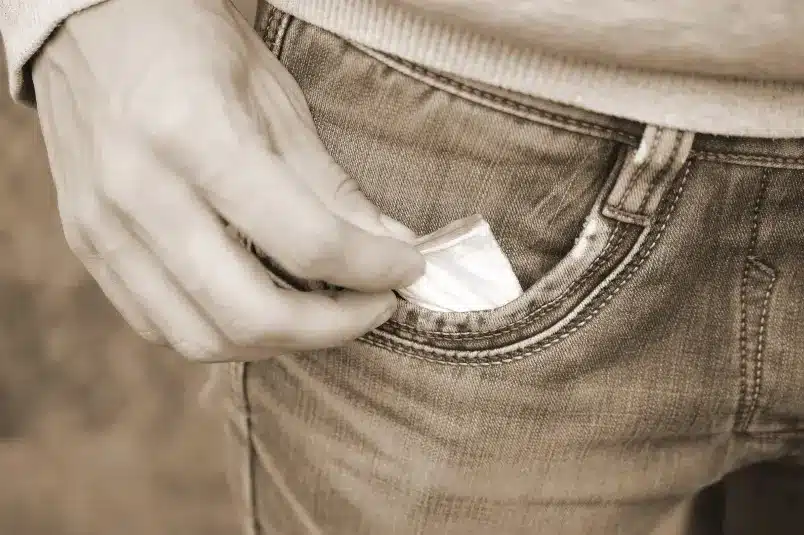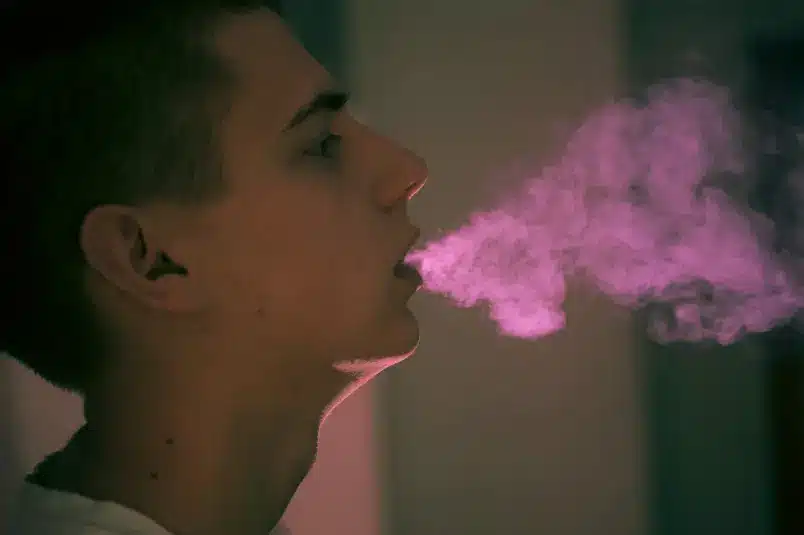It can be difficult to tell whether your drinking or your loved one’s drinking has shifted from casual to an alcohol use disorder or alcoholism. Answering some questions may help to determine an answer. Additionally, it is essential to understand the symptoms, health risks, and treatment options available.
Types of Drugs Commonly Used by Teens
The drug teens use most differs from one year to the next. However, commonly used substances by teens include:
Alcohol
Alcohol continues to be the substance used most commonly by teenagers. A National Survey on Drug Use and Health (NSDUH) showed that 414,000 teenagers between the ages of 12 and 17 have struggled with Alcohol Use Disorder (AUD). This amounts to 251,000 females and 163,000 males in this number for this age group.2
Older teens may frequently partake in binge drinking. Engaging in binge drinking in adolescence can become a risk factor for alcohol addiction. Binge drinking goes further than social drinking with friends at parties. Binge drinking involves drinking large amounts of alcohol over a defined period of time.
Illicit drugs
Heroin, methamphetamines, and cocaine are drugs that older teens may use. The NIH conducted a 2021 Monitoring the Future survey showing the following teen past illicit drug use statistics: 3
-
Around 10.2% of 8th graders
▻
-
Around 18.7% of 10th graders
▻
-
Around 32% of 12th graders
▻
This survey refers to illicit drugs: cocaine, marijuana, heroin, LSD, and other hallucinogens.
Illicit drugs can either inhibit or stimulate a person’s central nervous system. Certain types of illicit drugs will even cause hallucinogenic effects.
Prescription drugs are also a common drug teens use. Prescription drugs actually come third to alcohol and illicit drugs as the most commonly abused substances. These numbers reflect drug use in individuals in the U.S. who are aged 14 and older, according to SAMHSA.4
In 2014, more than 5,700 youths abused prescription drugs, according to the National Survey on Drug Use and Health. 5
There are various types of prescription drugs, including:
-
Depressants
▻
-
Opioids
▻
-
Stimulants (Ritalin and Adderall)
▻
How does drug abuse affect teens?
Exposure to substances that alter chemical functions can lead to long-term effects when a teen’s developing body is exposed to substances that alter chemical functions.
A decline in a teenager’s academic performance is one of the consequences of drug abuse. When a teen’s school performance is negatively affected by substance use there can be a larger impact. It can affect future opportunities like acceptance into higher education or career opportunities in adulthood.
There’s a link between substance use and poor judgment in things like:
-
Sexual activity
▻
-
Social interactions
▻
-
Impaired driving
▻
When people begin using substances at an early age, it can make social situations more of a challenge down the road. Developing social connections without having to use substances first becomes more difficult.
Substance abuse can also lead to citations like criminal charges or impaired driving charges. These legal charges can have a long-lasting impact on a person’s life.
Teen drug abuse can also increase their risk of developing depression, anxiety, or another type of mental health disorder.
According to the CDC, abusing substances can 6:
-
Impact a teen’s development and growth, particularly their brain development
▻
-
Occur more often with other types of risky behaviors like dangerous driving or unprotected sex
▻
-
Contribute to developing adult health issues, such as high blood pressure, heart disease, and sleep disorders
▻
Also, the earlier teenagers begin using drugs, the greater their risk of continuing to abuse drugs later in life. Essentially if a teenager
Vulnerability to drug use: teenagers vs. adults

Reasons why teens use drugs
According to the National Institute on Drug Abuse, teens experiment with alcohol and drugs because of five primary reasons:
-
To feel good (the brain’s pleasure pathways are activated)
▻
-
To fit in (social acceptance, peer pressure)
▻
-
To do better (enhance academic or athletic performance)
▻
-
To experiment (new experiences, thrill-seeking)
▻
-
To feel better (mental health, stress, physical pain)
▻
Risk factors for teen drug abuse
Certain environmental and biological factors can increase a teen’s risk of drug abuse. These include:
Impulse control issues
Teenagers who have difficulties controlling their impulses have a higher risk of engaging in risky behaviors. These risky behaviors include the abuse of alcohol or drugs.
Family history of alcohol or drug abuse
Genetics play a big role in increasing a teen’s risk of developing a substance abuse addiction.
Trauma
Teens have a greater risk for drug abuse later on in life if they’ve experienced some type of trauma, such as:
-
Being a victim of sexual or physical abuse
▻
-
Witnessing violence or death
▻
-
Surviving a natural disaster
▻
Certain types of therapy can help decrease the impact of trauma.
Peer pressure & popular culture
Teens often have to deal with pop culture and peer pressure, which frequently glamorizes the abuse of drugs. Teenagers who are unhappy or stressed might turn to alcohol or drugs to help make themselves feel better. Some teenagers may use drugs out of rebellion or boredom. While other teens may use drugs to feel “cooler” or have more confidence.
Mental health issues
Certain mental conditions can increase a teen’s risk of substance abuse, self-medicating, and addiction. These conditions may include ADHD, depression, eating disorders, and anxiety. Treating these types of illnesses can help decrease the risk of substance abuse issues.
What are the signs & symptoms to look out for
Parents can look out for many symptoms and signs to see if their teens are abusing drugs. But, it can be a bit challenging to decipher between actual drug use and the pangs of adolescence. Parents can find out what’s going on in their teen’s life simply by being proactive in talking with them.
Some common teen drug use signs include:
-
Bloodshot eyes
▻
-
Bad grades
▻
-
Poor hygiene
▻
-
Laughing for no reason
▻
-
Secretive behavior
▻
-
Diminished personal appearance
▻
-
Loss of interest in activities
▻
-
Smell of smoke on clothing or breath
▻
-
Missing curfew
▻
-
Avoiding eye contact
▻
-
Unusual tiredness
▻
-
Frequent hunger or “munchies”
▻
It’s the parent’s job to get the conversation going with their teen if they suspect they’re abusing drugs. Parents who think their teenager may be abusing drugs often don’t intervene, which can help prevent further drug abuse.

Having a conversation with teens about drug abuse
Parents will probably need to have multiple conversations with their teens about alcohol and drug use. They’ll need to choose times when they know they won’t be distracted or interrupted. There is a time when it’s not appropriate to have this conversation, such as:
-
When the parent is angry with their teen
▻
-
When the teen is high or drunk
▻
-
When the parent isn’t prepared to answer the teen’s questions
▻
To have a conversation about drugs with their teens, the parents should:
-
Talk about the reasons not to abuse drugs. Parents should emphasize how abusing drugs can impact the things their teen finds important. They shouldn’t use scare tactics but emphasize how drug use could impact things like driving, sports, appearance, and health.
▻
-
Ask their teen’s view. They shouldn’t lecture but listen to their teen’s questions and opinions about drugs and other substances. They should assure their teen that they can be honest with them.
▻
-
Talk about ways to resist peer pressure. Parents should sit down and brainstorm with their teens about ways to resist peer pressure and turn down drug offers.
▻
-
Consider media messages. Parents should realize that drug use is often glamorized through television programs, social media, music, and movies. They should discuss this fact with their teens and ask them about what they hear and how they feel.
▻
-
Be prepared to talk about their own drug use. Parents should be prepared to talk about their own past drug use if their teen asks about it. They should share with their teen such as why they chose not to use drugs or if they did use. Parents can also discuss what their personal experience taught them.
▻
If parents know or suspect their teen is misusing or experimenting with drugs, they should:
-
Talk with them. It’s never too early for a parent to intervene. Even if a teen is only experimenting with drugs, it can quickly turn into excessive use. In some cases it can develop into addiction and lead to legal troubles, accidents, or health issues.
▻
-
Focus on their teen’s behavior. Parents should focus on their teen’s behavior, not on them as a person. They’ll want to emphasize the dangers of using drugs, but assure their teen that they are not a bad person.
▻
-
Encourage honesty. Parents should remain calm and express their concerns to their teens. They should share their suspicions with their teen and verify any claims they make.
▻
-
Check in with their teen more regularly. Parents should spend more time with their teenagers, know where they are, and ask them questions when their teen returns home.
▻
-
Obtain professional help. If parents suspect their teen is abusing drugs, they should contact a counselor, doctor, and/or another health care provider for assistance.
▻
If their teenagers come clean about their drug use, parents should not overreact. Lashing out or overreacting can keep teenagers from opening up to their parents about their experiences. Parents can better understand their drug use when they get their teenagers to talk. It can help determine if their drug use is experimental or if it’s becoming an issue.
Parents should let their teens know how much they care about them and their future. Teenagers who feel loved and supported are more likely to talk about their drug use. They may also be more likely to stop experimenting with drugs. And they may feel more comfortable asking for help if their drug use has turned into a problem.
How to get treatment if they're addicted?
Many teenagers struggle to cope with unpleasant feelings, like sadness, during adolescence. Many turn to alcohol, marijuana, or other substances to experience some relief. But, the best way for teens to cope with stress or unpleasant feelings is to seek emotional support. If teenagers have already tried to reduce their use but failed, they must obtain treatment immediately.
Teen drug abuse treatment programs should be evidence-based and person-centered. Drug rehabilitation center professionals can design a personalized or individualized treatment plan. This treatment plan will best meet a teen’s needs, including outpatient and inpatient care.
A lot of effective treatments are available to teenagers who have been diagnosed with substance use disorders. Many treatment plans include motivational enhancement therapy, behavioral family therapy, and cognitive-behavior therapy (CBT). There are also medication therapies to help with teen drug use.
Effective treatment plans may include:
Detox
Most treatment plans for drug addiction or recovery from alcohol include detox. The beginning stages of drug or alcohol addiction treatment start with the detox process or detoxification. The detox process eliminates the chemical substances or toxins from the individual’s body.
For teens who are physically dependent on a drug or alcohol detox will be necessary. A comfortable and safe detox is an important part of their recovery process.
During comprehensive addiction treatment, medical professionals supervise the detox process to ensure the individual’s body safely eliminates toxins from the substances. During successful detoxification, brain chemistry is stabilized. This allows medical professionals to accurately assess the patient’s psychological and physical condition. In doing so they can decide on what their next steps should be for their individual recovery process.
A good detox program will:
-
Provide medical assistance that’s planned out and applied very carefully from a diverse team of exceptionally experienced and skilled professionals.
▻
-
Provide systematic support to patients for withdrawal from whatever their substance dependence is.
▻
-
Evaluate patients’ emotional and medical requirements, and provide psychiatric consultation and counseling as needed.
▻
-
Support patients, through group and individual therapy, in determining their relapse triggers and helping them learn strategies that will allow them to stay sober.
▻
-
Create individualized treatment plans that will meet each patient’s unique needs.
▻
-
Ensure there’s a long-term plan in place for treatment and recovery to support lasting sobriety.
▻
In-patient rehabilitation
The healing journey is different for each teen dealing with dependence, particularly if they’re also coping with an underlying condition. Residential treatment or inpatient drug rehabilitation provides around-the-clock intensive care for teenagers.
This treatment is typically for teens with severe substance abuse and mental health conditions. Inpatient rehab provides an extremely structured environment that benefits teens struggling with alcohol and drug misuse. Removing teenagers from their social influences and environment can potentially disrupt their behavioral and substance use patterns.
CBT
Cognitive-behavioral therapy or CBT addresses drug abuse in teens. This method works by helping them identify, avoid, and deal with high-risk circumstances. These high-risk situations include situations where they’re more likely to relapse or use. This type of treatment is available for inpatient and outpatient drug rehab.
Behavioral family therapy
This therapy allows teenagers to learn how their drug abuse impacts others. It teaches them about unhealthy and healthy relationships. Additionally, behavioral family therapy helps teenagers build a support system in their households. A strong support system can help to discourage them from alcohol or drug abuse.
Motivational enhancement therapy (MET)
MET is a type of treatment that provides teens with the skills they need to avoid substance abuse in the future. Trained clinicians use motivational interviewing to address teens’ readiness to receive treatment for their drug abuse and change. Clinicians will recommend certain coping skills for trigger or high-risk situations.
Dialectical behavior therapy (DBT)
This is a modified form of CBT with the primary goal of teaching individuals how to:
-
Develop healthy ways to deal or cope with their stress
▻
-
Live in the moment
▻
-
Improve their relationships with others
▻
-
Regulate their emotions
▻
Outpatient rehabilitation
Outpatient drug rehabilitation treatment programs often include group and individual therapy, or the two combined. Some teens may require an inpatient drug rehab and/or a complete drug addiction detox. If this is the case, they will need to complete such treatment before they can enter into outpatient services. This is especially true in cases of severe drug dependence.
Dual diagnosis treatments
In many situations, an individual struggling with addiction also has an underlying mental health condition. The second condition will also require treatment along with their addiction. This ensures the patient’s best chances of a long-lasting recovery. This is called a dual diagnosis.
The patient and the therapist will work together to determine if any underlying conditions co-occur with their addiction. Common dual diagnoses and underlying issues include:
-
Depression
▻
-
Bipolar disorder
▻
-
Anxiety disorder
▻
-
ADHD
▻
-
Other conditions
▻
Identifying and treating any underlying cause of the teen’s addiction is important. Typically, the teen’s therapy during their stay at drug rehab will focus on the dual diagnosis. Thus, they receive the best possible treatment for successful recovery.
If the teen has a dual diagnosis, they must be treated for their underlying mental health condition and their addiction. This treatment will heal not just their addiction but the teen as a whole person. If an underlying problem is left untreated, it can lead to the teen relapsing in the future.
Each teen responds differently to treatment and therapy. The right treatment plan for one teen is typically not the same for all teens. Of course, what’s mentioned above are not the only treatments or therapies available.
The best treatment plan will specifically address the needs of each teen. Professionals will work with each teen as an individual. Focusing on the best treatment plan for their personal situation, needs, and recovery is essential.
Sources
- National Center for Drug Abuse Statistics (NCDAS). Drug Use Among Youth: Facts & Statistics. Retrieved July 14, 2022, from https://drugabusestatistics.org/teen-drug-use/
- National Institute on Alcohol Abuse and Alcoholism. Alcohol Facts and Statistics. Retrieved July 14, 2022, from https://www.niaaa.nih.gov/publications/brochures-and-fact-sheets/alcohol-facts-and-statistics
- National Institute on Drug Abuse. Monitoring the Future 2021 Survey Results. Retrieved July 14, 2022, from https://nida.nih.gov/research-topics/trends-statistics/infographics/monitoring-future-2021-survey-results
- Substance Abuse and Mental Health Services Administration (SAMHSA). Talking With Your Teen About Opioids: Keeping Your Kids Safe. Retrieved July 14, 2022, from: https://www.samhsa.gov/sites/default/files/TTHY-Opioid-Broch-2020.pdf
- (Last Updated April 14, 2022). Substance Abuse and Mental Health Services Administration. Rise in Prescription Drug Misuse and Abuse Impacting Teens. Retrieved July 14, 2022, from https://www.samhsa.gov/homelessness-programs-resources/hpr-resources/rise-prescription-drug-misuse-abuse-impacting-teens
- Centers for Disease Control and Prevention. Teen Substance Use & Risks. Retrieved July 14, 2022, from https://www.cdc.gov/healthyyouth/substance-use/index.htm
- Mariam Arain, Maliha Haque, Lina Johal, Puja Mathur, Wynand Nel, Afsha Rais, Ranbir Sandhu, and Sushil Sharma. Maturation of the adolescent brain. Neuropsychiatr Dis Treat. 2013; 9: 449–461. doi: 10.2147/NDT.S39776 https://www.ncbi.nlm.nih.gov/pmc/articles/PMC3621648/
- Linda Patia Spear. ADOLESCENTS AND ALCOHOL. Curr Dir Psychol Sci. 2013 Apr 1; 22(2): 152–157. doi: 10.1177/0963721412472192.https://www.ncbi.nlm.nih.gov/pmc/articles/PMC4192652/




